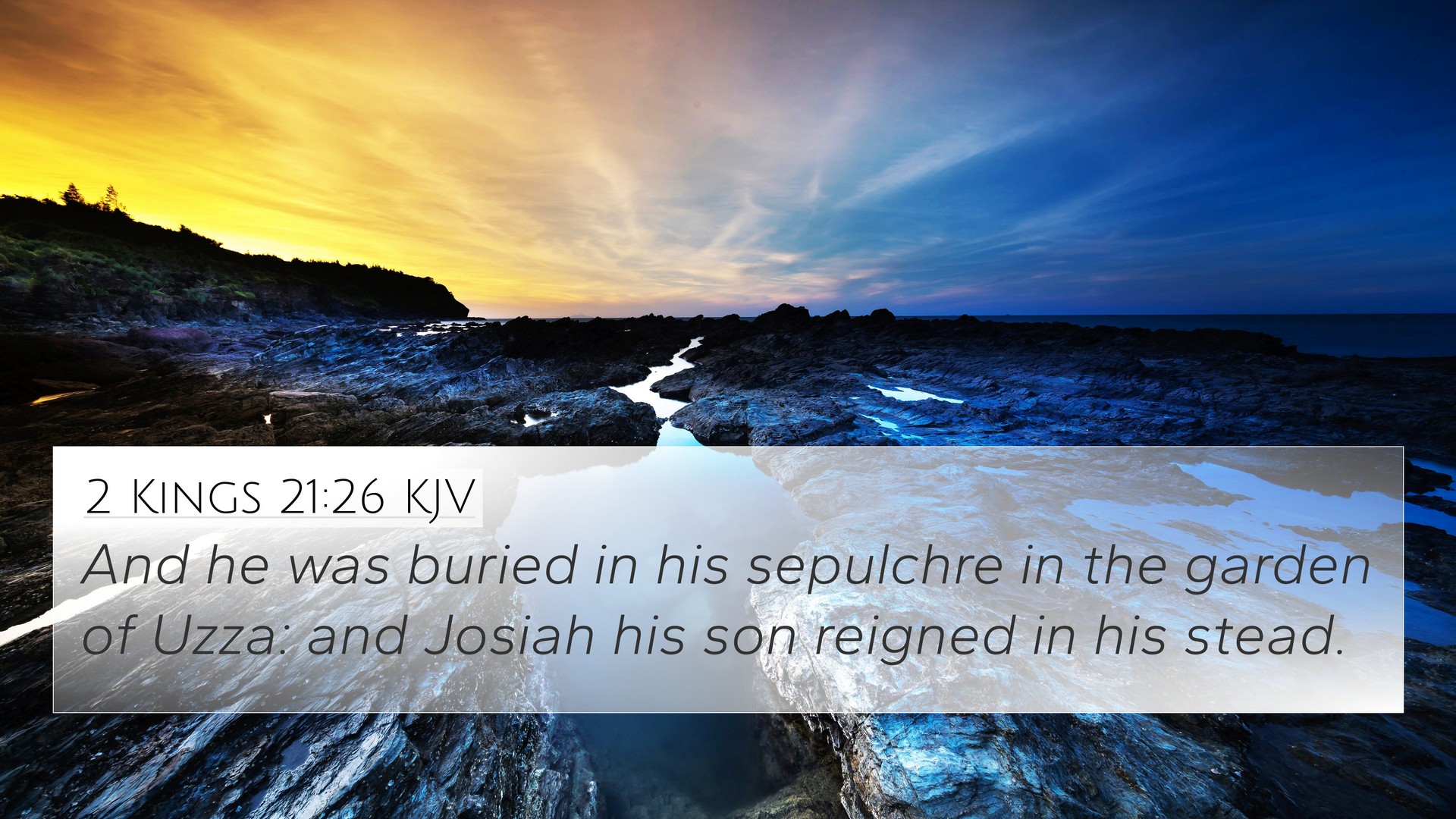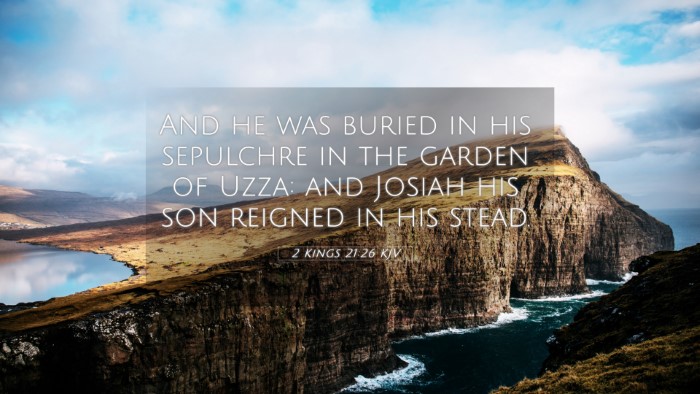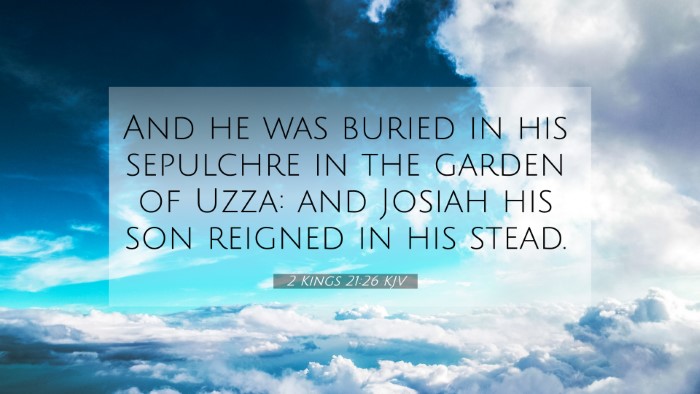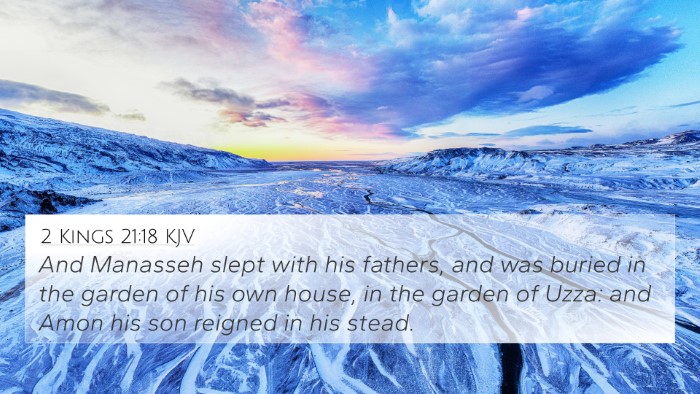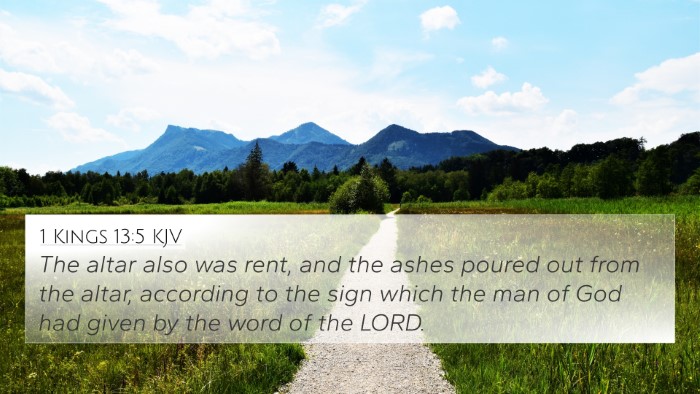Understanding 2 Kings 21:26
This verse reads: "And he was buried in his own house, in the garden of Uzza: and Amon his son reigned in his stead."
Summary of 2 Kings 21:26
2 Kings 21:26 concludes the account of King Amon of Judah, depicting the end of his reign and the transition to his son. This verse emphasizes the fate of Amon and highlights the continuity of the Davidic line, as his son takes over the kingdom.
Commentary Insights
-
Matthew Henry: In his comprehensive commentary, Matthew Henry underscores the significance of Amon's character and reign. He notes that Amon was one of the kings who did evil in the sight of the Lord, following in the ways of his father Manasseh. Henry highlights that Amon's burial in his own house, rather than in the royal sepulchres, reflects the disdain his rule incurred from the people due to his idolatry and evil practices.
-
Albert Barnes: Barnes offers a historical perspective on Amon's brief reign, lasting only two years. He comments on the importance of Amon's burial place, indicating that it was a sign of the people's rejection of him, and he contrasts this with the honor typically afforded to kings. Amon's son, Josiah, is noted to have reversed many of his father's wrongs, making this verse a transitional point for the nation of Judah.
-
Adam Clarke: Clarke emphasizes the continuity of Amon's lineage through his son, drawing out the theological implications of God's promise to David regarding his descendants. Clarke also discusses the cultural context surrounding burial practices, pointing out that the garden of Uzza was a notable location, yet Amon's lesser burial signifies a break from tradition in light of his actions as king.
Thematic Connections
This verse is deeply connected to various themes within scripture, particularly relating to the recurring cycle of kingship in Israel and Judah, divine judgment, and the faithfulness of God's promises. The following biblical themes and verses are relevant:
- Divine Judgment and Leadership: 2 Kings 21:20-22 reflects God's perspective on Amon's reign.
- The Davidic Covenant: 2 Samuel 7:11-16 assures the continuation of David's lineage, relevant in understanding Josiah's future reign.
- Reformation and Restoration: 2 Kings 22-23 illustrates the reforms brought by Josiah, contrasting with Amon's rule.
- The Consequences of Idolatry: Jeremiah 7:31 discusses the repercussions faced by Judah due to idolatry, echoed in Amon's life.
- The Nature of Kingship in Israel: 1 Samuel 8:6 contrasts the divine desire for righteous leadership versus human kingship.
- Burial Practices in Ancient Israel: Genesis 23:19 provides an understanding of Hebrew burial customs, important for interpreting Amon's burial.
- Elegy for the Wicked: Proverbs 14:32 touches on the ultimate fate of the wicked, pertinent to Amon's life and death.
Cross-References for 2 Kings 21:26
To deepen your study of this passage, consider these cross-references that illustrate the connections between biblical texts:
- 2 Kings 21:20 - Details Amon's evil in the sight of the Lord.
- 2 Kings 22:1-2 - Introduces Josiah and his reformative actions.
- 2 Chronicles 33:21-23 - Provides additional context on Amon’s character.
- Jeremiah 22:11 - References the fate of kings in Judah.
- 2 Chronicles 34:1-3 - Josiah's reign emphasizes the shift from Amon's practices.
- Ezra 2:36-39 - A chronological note on priests following Amon's lineage.
- Micaiah in 2 Chronicles 18:12-17 - Illustrates how the kings’ actions tie into the prophetic narrative.
Application and Reflection
This insightful passage invites readers to reflect on the nature of leadership, legacy, and divine judgment. The story of Amon serves as a sobering reminder of the consequences of straying from God's commands and the ultimate promise of restoration through his descendants. This calls for an essential examination of one’s own life and leadership principles.
Tools for Bible Cross-Referencing
For those interested in exploring the connections between Bible verses, the following tools and methods can enhance your understanding:
- Bible Concordance: Utilize a concordance to locate specific verses and their occurrences throughout scripture.
- Bible Cross-Reference Guide: Reference guides provide curated connections for deeper studies.
- Cross-Referencing Bible Study Methods: Explore thematic studies that link related verses.
- Comprehensive Bible Cross-Reference Materials: Various study books can assist in understanding complex themes.
Conclusion
The verse 2 Kings 21:26 encapsulates the culmination of Amon's reign and introduces a pivotal transition in Judah's history. By examining cross-references, we uncover a richer narrative that contributes to a deeper theological understanding, reinforcing the significance of God’s faithfulness amidst human failure. This exploration serves as a valuable resource for both personal study and communal discussions.
